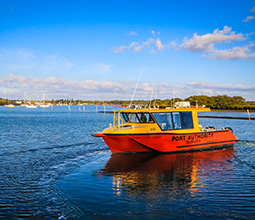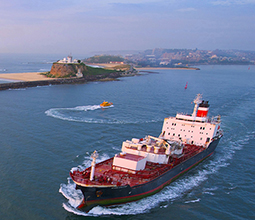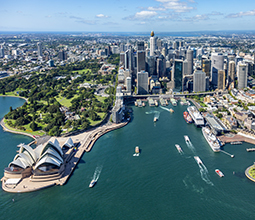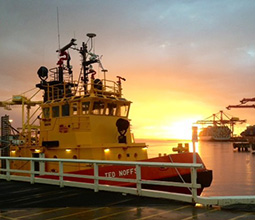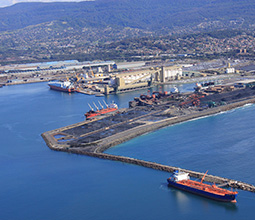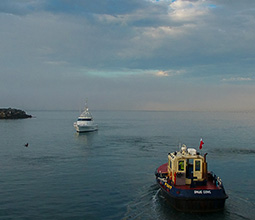Across all its six port locations, Port Authority manages an array of statutory and non-statutory charges in accordance with the Ports and Maritime Administration Act 1995 and the Ports and Maritime Administration Regulation 2021.
Applicable charges managed by Port Authority include navigation, pilotage, site occupation, wharfage and miscellaneous. These charges are different in each port and are levied to all commercial vessels, including cargo and passenger vessels, piloted fishing vessels, research vessels and piloted tugs.
| Port Location | Applicable Charges |
| Sydney Harbour | Navigation, Pilotage, Site Occupation, Wharfage and Miscellaneous |
| Port Botany | Navigation and Pilotage |
| Newcastle | Pilotage |
| Port Kembla | Pilotage |
| Port of Eden | Navigation, Pilotage, Site Occupation, Wharfage and Miscellaneous |
| Port of Yamba | Navigation, Pilotage, Site Occupation, Wharfage and Miscellaneous |
Click here to download the Schedule of Port Charges - effective 1 July 2023: FY 2023/24 Schedule of Port Charges for Port Authority of New South Wales
Click here to download the Schedule of Port Charges - effective 1 January 2023: FY 2022/23 Schedule of Port Charges for Port Authority of New South Wales
Click here to access information on the Good Neighbour Charge - White Bay Cruise Terminal Noise Mitigation Strategy
Click on a port to access the full list of statutory and non-statutory charges at that port.
Port Charges - FAQ
- Since 1 June 2013, Port Botany assets have been managed by a private entity under the name of NSW Ports, who is leasing this area from the NSW Government in a 99-year arrangement.
- NSW Ports provide charges to their customers in relation to the loading and unloading of container and non-container cargoes, and in some occasions for the time-base usage of specific berths. These customers are the major shipping lines. If you are a particular end-customer and not a major shipping line, you will need to get in touch with either a freight forwarder or shipping agent who will provide you details on the applicable charges, in relation to the container type and size, commodity and routing.
Since 1 June 2013, Port Kembla assets have been managed by a private entity under the name of NSW Ports, who is leasing this area from the NSW Government in a 99-year lease. On the other hand, the bulk liquids terminal at Gore Bay is owned by another private operator, Viva Energy. The charges to be levied to the vessel discharging bulk liquids for the proposed transaction will be a combination of charges, based on location and activities. Here is it a break down:
- Navigation at Port Kembla entry is managed by NSW Ports (Port Kembla)
- Wharfage at Port Kembla’s Bulk Liquids Terminal is managed by NSW Ports (Port Kembla)
- Site Occupation at Port Kembla’s Bulk Liquids Terminal is managed by NSW Ports (Port Kembla)
- Pilotage at Port Kembla is managed by Port Authority of New South Wales.
- Navigation at Sydney Harbour entry is managed by Port Authority of New South Wales.
- Pilotage at Sydney Harbour is managed by Port Authority of New South Wales.
For any other operational fees occurring at Gore Bay, please contact Viva Energy.
Port Authority is happy to meet face-to-face with any new shipping agent and owner that wishes to better understand Port Authority’s operational charges to specific cargoes and locations. Please, contact Port Authority’s General Manager, Property & Commercial on [email protected] for further details.
No.
The only vessels exempt from paying port charges are the Australian naval vessels. As per Clause 75, Division 8 and Part 5 of the Ports and Maritime Administration Act 1995 (PAMA), all statutory charges managed by Port Authority of New South Wales under any of the port locations of this state owned corporation do not apply to or in respect of a vessel belonging to the Defence Force of Australia, or its passengers or its cargo.
All Passenger Vessels arriving at any of the dedicated or non-dedicated passenger berths in Sydney Harbour are levied a combination of port charges, all compulsory. These are: navigation, pilotage, site occupation and miscellaneous charges. You can find all the standard rates for each individual charge here. However, and as per Port Authority’s Passenger Vessel Protocol, both Athol and Point Piper buoys are to be used on a case-by-case basis for transit calls only, and not for turn-around calls, as in this case.
We encourage you to get in touch with the [email protected] to discuss other operational alternatives to service your passenger vessel. This will provide a better indication on the overall charging for this particular vessel movement.




